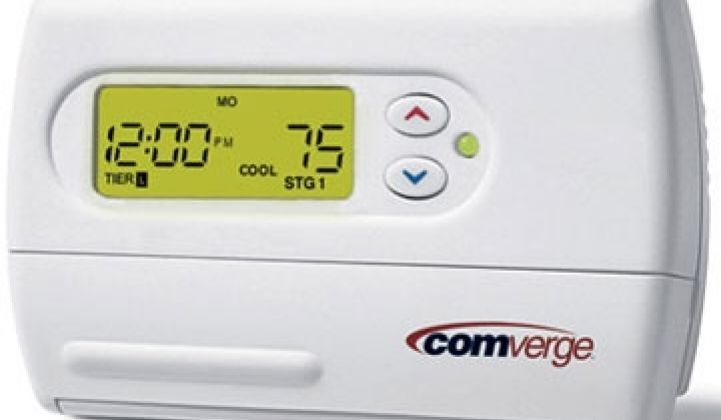Comverge Inc. (NSDQ:COMV) on Thursday reported a first quarter 2009 loss of $9.1 million compared to an $8.8 million loss in the same quarter last year, amidst a growing customer base for the demand response and energy efficiency services it offers.
Revenue for the first quarter of 2009 was $11.6 million, up 11 percent from revenues of $10.5 million in the same quarter of 2008.
That did not include an estimated $11.5 million in revenues from a class of contracts that won't be reported in full until the fourth quarter, CEO Bob Chiste noted in a conference call.
Those "virtual peaking capacity" revenues — largely representing the residential demand response contracts that set Comverge apart from its competitors, which serve commercial and industrial customers — were up from $4.3 million in the same quarter last year, representing a stronger increase than revenues not subject to that deferred recognition (see Demand Response: The Home vs. C&I Debate).
The East Hanover, N.J.-based company added 450 megawatts under management in the first quarter, bringing it to a total of 2,600 megawatts under management at the end of the quarter in March.
Since then, Comverge has grown to 2,767 megawatts under management, Chiste said. That puts the company very close to demand response competitor EnerNoc (NSDQ: ENOC), which reported 2,700 megawatts under management as of the end of March.
EnerNoc on Wednesday reported a first quarter loss of $12.5 million on revenues of $18.4 million, compared to a loss of $11 million on revenues of $18.6 million in the same quarter of 2008 (see Green Light post).
In general, Comverge, EnerNoc and other demand response aggregators like CPower, EnergyConnect and Constellation NewEnergy help their customers cut power during peak demand times in exchange for payment from utilities or grid operators.
But Comverge's business - which includes residential demand response as well as turnkey sales to utilities that include hardware like remote-controlled thermostats - makes its business "very diverse and complex, compared to their peers," said Ben Schuman, analyst with Pacific Crest Securities.
That gives them opportunities to take advantage of growth in different lines of business, "but it also makes execution pretty difficult across the board," he said.
Opportunities could be particularly rich in the turnkey and hardware-related lines of business, which are often linked to utility smart meter deployments, Schuman noted.
"The question is, what kind of return can they get on those hardware deployments," he noted, given the many competitors in that field, such as Tendril Networks, Energate, Cooper Industries Ltd. and Radio Thermostat Corporation of America.
Among Comverge's first-quarter deals were a 200-megawatt, five-year contract with Maryland-based utility Pepco Holdings Inc. and 48 megawatts of aforementioned virtual peaking capacity contracts with two Maryland utilities (see Green Light post).
The company also introduced in the first quarter its Apollo software platform, meant to give utilities control over both Comverge's one-way paging-based control systems and new two-way communications enabled by smart meters or broadband connections (see Green Light post).
That platform is now being used by three utilities deploying smart meters, and Comverge intends to make it part of several projects that are seeking part of the $4.5 billion in smart grid project grants created under the federal stimulus package passed in February, Chiste said.
The Department of Energy, which will administer those grants, has come under some criticism for preliminary guidelines that would place a $20 million cap on grants for commercial-scale smart grid projects, which could exclude many larger-scale projects, including smart meter deployments by major utilities.
Those asking the DOE to lift that cap for some projects include Google and the Gridwise Alliance, a consortium of smart grid-related companies.
Chiste noted Thursday that the proposed $20 million cap "has certainly disappointed some of the large metering companies."
"On the other hand, from our perspective, that's just a wonderful sweet spot," given that many of Comverge's project fall into the $30 million to $50 million range, he said. "We're seeing a great number of opportunities with the alliances we're building."



